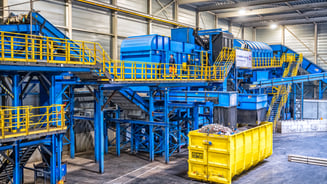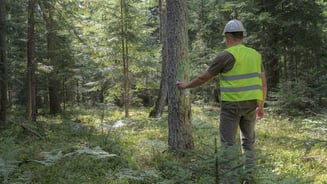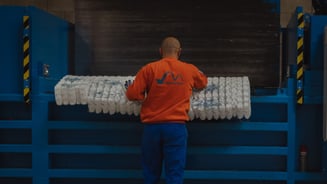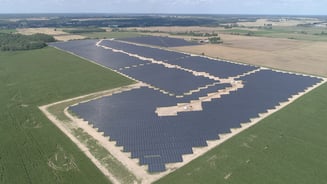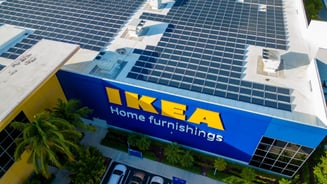Peter Jones, Global Head of Sustainability Analytics and Impact at Ingka Group, shares his views on why integrating sustainability into business decisions should consider the impact not only on profit, but also on the impact of people and planet.
Climate change is the defining challenge, and all sustainability areas are interlinked. Without an equal world we won’t achieve climate action. As a large retailer, IKEA is committed to tackling climate change and ensuring that we balance economic growth and positive social impact with environmental protection and renewal. By 2030 our ambition is to become circular and climate positive.*
Integrating sustainability into the business and into business decision making is fundamental to reach this ambition and for the long-term viability of the business. All successful companies need to create value for stakeholders while also making a positive social contribution to society and impacting the planet positively. To do this several steps need to take place within a company:
- Purpose
- Relevance and distributed ownership
- Measurement
Purpose
It is important to state that the purpose of the company is about more than just making short term profit and is also about ensuring the long-term viability of the company, and having a positive impact on people, and the planet. Having a stated purpose will move the mindset of the company, which is the most important factor in making change happen.
The best way to ensure real action starts is to set bold targets. From a planetary perspective the most scientific way to show an organisation’s seriousness is to set Science Based Targets pursuing a world limiting global warming to 1.5°C. The Science Based Targets Initiative (SBTi) have recently set a new standard for becoming “net zero” that has clear guidance on how to set these targets.
Aligning with the most appropriate global Sustainable Development Goals (SDGs) is another way to ensure that the goals of an organisation are in line with what is needed. Finally, the purpose and goals need to be communicated and transparency is becoming more important, both internally and externally, with new requirements coming from EU Green Deal, EU taxonomy, the Corporate Sustainability Reporting Directive (CSRD) and globally the International Sustainability Standards Board (ISSB).
Sharing the goals both internally and externally ensures that an organisation is held accountable by employees and external stakeholders and allows for engagement with them to work together to benefit the organisation and people and planet.
Relevance and distributed ownership
Making the sustainability objectives of a company relevant to what the company does is paramount for the credibility and actionability of the integration and the buy-in from employees. It cannot only be the top management of a company or, conversely, the front-line employees who work to deliver a company’s sustainability objectives. It is important to ensure distributed ownership across all levels of a company and most importantly to hook into the passions of individuals.
There is a reason that employees work for a company and if the sustainability purpose is relevant then it is easier to hook into the individual passions of the employees who want to make a difference.
Measurement
To fully integrate sustainability into decision making all employees need to be measured and followed up on more than just profit. Integrating sustainability measurements into the performance follow-up ensures people are conscious about what is important for the company and will support the mindset shift coming from having a purpose based on more than profit.
One example of this is the integration in Ingka’s performance which is followed-up in the value creation goals which internally looks at how we are setting goals and evaluating our performance by being ‘better’ in four ways: better homes, better lives, better planet and better company. This introduced a new way of reporting and was published in the FY21 Ingka Group Annual Summary and Sustainability Report.
To truly understand the impact an organisation is having there is a need to not only measure performance, but to go further than this and understand the value this brings to people and the planet.
There are different levels of sustainability measurement, and while they are interconnected there is a benefit of looking at them as different aspects as well as potential steps on a journey of maturity.
When the measurements are in place it is important to ensure they are used for holistic decision making and are integrated within the organisation’s performance framework:
- Impact – the impact organisations have is about both the performance of the business and the value it brings.
- Different levels of sustainability measurement – there are three levels with different uses. This includes models based on actions and estimates, actionable decision-making and customer facing measurements.
- Building a framework for holistic decision making – The measurements should be integrated into the companies framework for performance to ensure that they are used to make holistic business decisions.
Measuring performance tells companies how successful they are in reaching set targets and while annual models are good for checking the long-term direction, the real power comes in enabling employees to see their individual impact and allowing customers to make informed choices based on the sustainability credentials of products and services.
*IKEA climate positive means to reduce more greenhouse gas (GHG) emissions than the IKEA value chain emits by 2030, while growing the IKEA business. IKEA is committed to the Paris Agreement and to contribute to limiting the global temperature rise to 1.5°C above pre-industrial levels. This includes a commitment to halve the absolute net GHG emissions from the total IKEA value chain by 2030. We will achieve this by drastically reducing GHG emissions through science-based targets and by removing carbon from the atmosphere through natural processes and storing it in land, plants and products through better forest and agriculture management within the IKEA value chain. We will contribute to further greenhouse emission reductions in society by going beyond IKEA, such as enabling customers to generate renewable energy at home.
Media enquiries
For further information, journalists and media professionals can contact us at [email protected] or by calling +46 70 993 6376.




